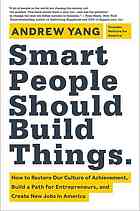
Smart People Should Build Things
How to Restore Our Culture of Achievement, Build a Path for Entrepreneurs, and Create New Jobs in America
کتاب های مرتبط
- اطلاعات
- نقد و بررسی
- دیدگاه کاربران
نقد و بررسی

November 25, 2013
Entrepreneur and “recovering lawyer” Yang is the founder and CEO of Venture for America, a nonprofit that seeks to match top graduates with startups and other high-growth companies. Yang suggests that many young people graduate from college and seek jobs in finance, law, and medicine because it’s expected of them. The downside is that many of these promising young people hit their mid-20s with tons of student debt, and realize they’ve been trained very narrowly, in addition to not enjoying their jobs. How much could the world be changed if these young and energetic people went to startups, rather than going corporate? Yang’s pitch for entrepreneurship as a viable alternative to more structured careers is enticing, but readers will get the book’s points after the first 10 pages. Overall the book, which contains far too much of Yang’s own story, reads like an advertisement for Venture for America. A few half-hearted tips only serve to throw the overall weak presentation into stark relief. Agent: Byrd Leavell, Waxman Leavell Literary.

January 15, 2014
A small-business guidebook promoting entrepreneurialism over a corporate career. Yang, the founder of Venture for America, a program steering new college graduates toward startup businesses, believes in the power of innovation and venture development. In his first book, which could be perceived as a thinly veiled promotional vehicle for his nonprofit organization, the author clearly advances the idea of new business-building rather than universities' robotically funneling top grads toward traditional high-profile arenas like financial institutions, law firms or management consultancies. "I meet seniors in college all the time," writes Yang, "and they have a very vague idea of what roles are available to them beyond the obvious ones and little sense of how the economy functions." On the other hand, he writes, there are unlimited possibilities in startup businesses once candidates gain training and on-site experience. Yang generously shares his own personal journey: being raised "conscious of money," spending uninspiring years in law school, then creating a succession of influential companies that made him a millionaire at age 34. His success story of finding fulfillment in the nonprofit sector after overcoming the harsh realities of student loan debt and fleeting job satisfaction forms the foundation of the book's principles of entrepreneurial team building, dedication and earnest product development. Yang firmly believes initiatives like Venture for America stimulate new graduates to build startup businesses rather than becoming individual contributors in what is often a creativity-stifling corporate world environment. This enterprising outlook expands employment options and opportunities in nontraditional job sectors, as well. The author's use of business statistics and bullet-pointed lists of his own lessons learned are enlightening and frequently surprising and moves much of his pro-entrepreneurship slant from conventional wisdom into fact-based guidance for the "young, hungry talent" he hopes will help rebuild the American economy. A galvanizing amalgam of personal history, acquired business wisdom and mentorship.
COPYRIGHT(2014) Kirkus Reviews, ALL RIGHTS RESERVED.

























دیدگاه کاربران